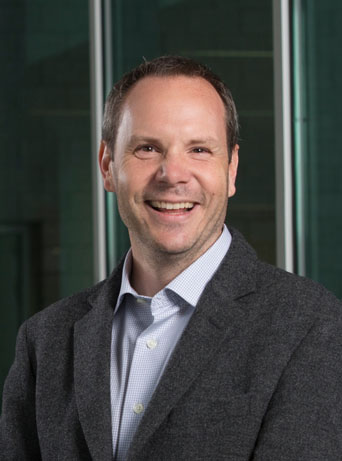
Peter Mandaville. Creative Services photo.
After two years on loan to the State Department, Peter Mandaville is happy to be back in the classroom at George Mason University.
Although the government and politics professor at George Mason’s Schar School of Policy and Government enjoyed his role in the Obama administration, he noted that academia has a more predictable rhythm than combating international terrorism.
“There are comfortable habits and a reliable control over your time and schedule,” he said from his office at Mason’s Fairfax Campus. At the State Department, he said, “it was completely the opposite.”
Mandaville was a senior advisor in the Office of Religion and Global Affairs, which was established by former Secretary of State John Kerry to develop initiatives and policies to engage religious leaders who might be influential in the war on terrorism.
“It was [Kerry’s] idea that religion is a force that is highly influential in many societies around the world—for good, or ill sometimes,” Mandaville said. “He also suspected that many U.S. diplomats didn’t necessarily understand how to engage religious leaders in support of American policy priorities.”
Mandaville’s primary task was to lead a team focused on the role of religion and religious engagement as part of the U.S. strategy to combat ISIS. This involved developing projects and initiatives to address sectarian tensions on the ground in Iraq, as well as working with other offices at the State Department and other agencies in using religion to counter violent extremism.
In addition to his ISIS-related work, Mandaville also spearheaded the development of a new “religious engagement toolkit” for American diplomats, providing them with a framework, methods and best practices for engaging with religious actors to advance the full range of U.S. foreign policy priorities—from combatting corruption to addressing the challenges of climate change.
Was he successful? “I went into this gig with the metric of success being ‘If fewer people get killed because of the work I do, I’m going to call that success.’ So, yes, I think so.”
Mandaville is able to use his recent experience in the federal government directly in his two undergraduate classes at Mason.
“Students have a lot of questions about how the policy process works given the sorts of issues we’re receiving as executive orders from the White House,” he said.
For example, Schar School students have been closely following news of significant staffing and structural changes at the National Security Council (NSC), the nerve center of U.S. foreign policy and national security. Mandaville worked regularly with the NSC and so has been able to help students make sense of what they’re reading in the news.
Senior government and international politics major Taylor Pigram, who is also minoring in Middle East studies, said Mandaville manages to “bridge the gap between understanding class content and connecting it to current U.S. policy and legislation.”
Pigram said the beginning of each session of Mandaville’s Islam and Politics class involves a discussion of current events, with students giving their perspective and asking Mandaville’s opinion or experience.
“But students are consistently offered a space each class to expand on their own thoughts and ideas about the subject,” she added.
Pigram, who plans to work as an attorney specializing in legal and policy issues in transitioning countries in the Middle East, said Mandaville’s experience at the State Department offers students who are interested in working in the government “an invaluable opportunity.”
Mandaville, who has taught at Mason since 2000, is just as impressed with his students as they are with him.
“When I first came here I very quickly realized what type of place Mason was, given the backgrounds of our students,” he said. In one early class, he recalled, “I was talking about the leader of an obscure political faction in northern Iraq and one of my students said, ‘Oh yeah, my dad used to work for him.’ That was my first taste of it, and there are more stories like that.”
